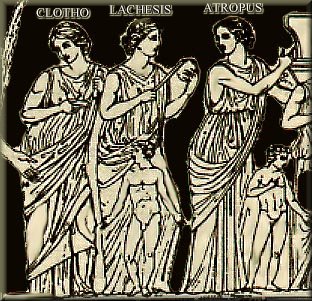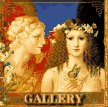|
MYTH MAN'S HOMEWORK HELP The Fates (or Moirae) are the three sisters, robed in white, who decide on human fate. Lachesis sings of the things that were, Clotho those that are, and Atropos (or Atropus) the things that are to be. Of the three, Atropos is the smallest in stature, but the most terrible and feared. Even though the Fates are often depicted as old, ugly and unmerciful, they are most honored among the gods because they distribute justly and have a share in every home. They give men at their birth their share of evil and good, and equally they punish the transgressions of both men and of gods. Atropos is said to be the eldest, the best and the shortest of the sisters. Clotho is the "spinner" and Lachesis the apportioner of lots. The thread of life is spun upon Clotho's spindle, measured by the rod of Lachesis and finally snipped by the shears of Atropos, the inevitable one. Their priests and ministers were always oracles, seers and soothsayers. It is said that only Zeus, the King of the Olympian gods, can weigh the lives of men and that it is he who informs the three sisters of his decisions. In that case, the Fates are viewed only as the instrument of Zeus. Still others claim that not even Zeus is beyond the power of the Fates and that he is subject to their whim. That would make the Fates the most powerful of all the deities. How powerful are they? Some say that Zeus is above Destiny and that it obeys him. For Zeus has been also called "the Bringer of Fate" and "Leader of the Fates" because he knows the affairs of men, all that the Fates give them, and all that is not in their fate. But others claim that even Zeus has to obey Destiny. But it has also been claimed that Tyche (Luck, Fortune) was one of the Fates and the most powerful of the sisters because beauty and virtue and good fame are in her keeping and her pleasure is to dash immoderate hopes. In the abode of the Fates are the records of all that happens on tablets of brass and iron, which are neither shaken by warfare in heaven, nor lightning, nor any destructive power. They are eternal and secure, these archives of the Fates. Some humans however claim that men themselves control their Fates by avoiding unnecessary dangers. The younger gods laugh at the Fates and Apollo once went so far as to make them drunk in order to save his good friend Admetus from death. The Fates played a role in many myths. During the war between the Giants and the Olympians the Fates armed themselves with clubs and fought and killed a couple of Giants. They also deluded Typhon when he came with an attitude to challenge the rule of Zeus. The Fates gave the monster Typhon to taste of the ephemeral fruits and convinced him that he would be strengthened by them. Instead the fruit weakened Typhon, helping Zeus to demolish him and establish his supremacy on Mount Olympus. When the hero Meleager was seven days old the Fates came and declared that the new baby would die when the log burning on the hearth would finally burn out. Clotho said that he would be noble and Lachesis that he would be brave, but Atropos looked at the brand burning on the hearth and said: "He will live only as long as this brand remains unconsumed." On hearing this, his mother snatched up the log and hid it in a chest, carefully preserving it. But as "fate" would have it, Meleager eventually killed his uncles and his mother, consumed by grief at the slaughter of her brothers, brought out the fire brand and kindled it. Just as the Fates had prophesized, Meleager was killed. When Zeus fell in love with the Nereid Thetis the Fates prophesized that the son born of any union with Thetis would grow up to become mightier than his father. Zeus, afraid that the same fate would befall him, as it had his own father Cronus, backed off and left Thetis alone. She ended up marrying the mortal Peleus and eventually gave birth to Achilles, the greatest hero of the Trojan War. At Delphi, the seat of Apollo's oracle, only two Fates are worshipped, those of Birth and Death; and at Athens Aphrodite Urania is called the eldest of the three. There are various versions of their parentage: 1) Erebus & Nyx (Night) 2) Nyx (Night) 3) Chaos 4) Zeus & Themis 5) Ananke (Necessity) The Fates are said to have invented seven of the letters of the alphabet: alfa, vita, ita, taf, iota and ipsilon. |

